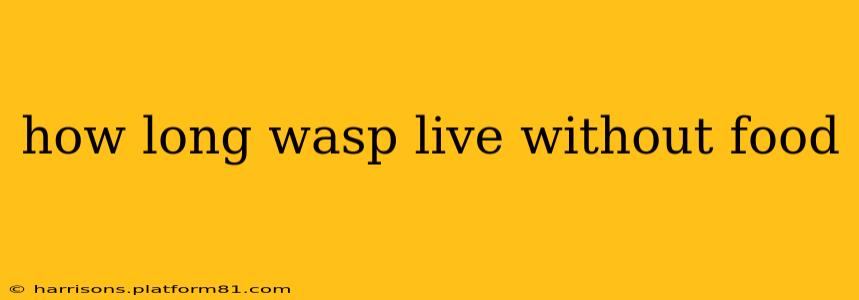How Long Can Wasps Live Without Food?
Wasps, those buzzing insects often associated with picnics and summer barbecues, have a surprisingly complex life cycle and varying lifespans depending on the species and their role within the colony. Understanding how long a wasp can survive without food depends on several factors, including the wasp's species, its life stage (adult, larva, pupa), and environmental conditions like temperature. There's no single definitive answer, but let's delve into the specifics.
How long can adult wasps live without food?
Adult wasps, unlike their larvae, require food for survival. Their survival time without food is relatively short, typically a few days to a week at most. Several factors influence this timeframe. Species with higher metabolisms will likely perish faster. Cooler temperatures can slow metabolism, slightly extending their survival time, while warmer temperatures accelerate it, leading to a quicker demise. Dehydration, a significant concern without access to water-rich sources like nectar or dew, further shortens their lifespan. Essentially, adult wasps are not built to withstand prolonged starvation.
What about wasp larvae?
Wasp larvae are a different story. They are entirely dependent on the adult wasps for food. The larvae live in the nest, primarily consuming food provided by worker wasps. Therefore, the survival of the larvae is directly linked to the ability of the adult wasps to find and bring food back to the nest. If adult wasps are unable to provide food, the larvae will starve and die. Their survival time without food is thus highly dependent on the colony's ability to forage and depends entirely on the adult's actions.
Does the species of wasp matter?
Yes, significantly. The size and metabolism of different wasp species directly impact their survival time without food. Larger wasps may have slightly higher energy reserves and could potentially survive a bit longer, but the difference is not substantial. The differences between social wasps (like yellow jackets and hornets) and solitary wasps are also important to consider. Solitary wasps don't have the support system of a colony to help them find food, meaning their chances of survival without food are generally lower.
What are the environmental factors affecting survival time?
Temperature and humidity are critical environmental factors. Hot, dry conditions accelerate the rate of water loss, leading to rapid dehydration and death. Conversely, cooler and more humid conditions can slightly extend the survival time but won't significantly change the overall outcome. Access to water is crucial; even a short period without a water source dramatically impacts a wasp's survival.
Can a wasp's stored energy reserves affect how long they live without food?
Wasps do not store significant amounts of energy reserves to compensate for prolonged periods without food. Their bodies are designed for active foraging and immediate energy consumption. While some energy might be stored in their bodies, it's insufficient to sustain them for extended periods of starvation.
In summary, while a precise answer to "How long can a wasp live without food?" is difficult to give, the general consensus is that it's a matter of days, rather than weeks, for adult wasps. Larvae are entirely dependent on the adult wasps' foraging abilities. The specific species of wasp, temperature, humidity, and access to water are all crucial factors that dictate their survival time.
